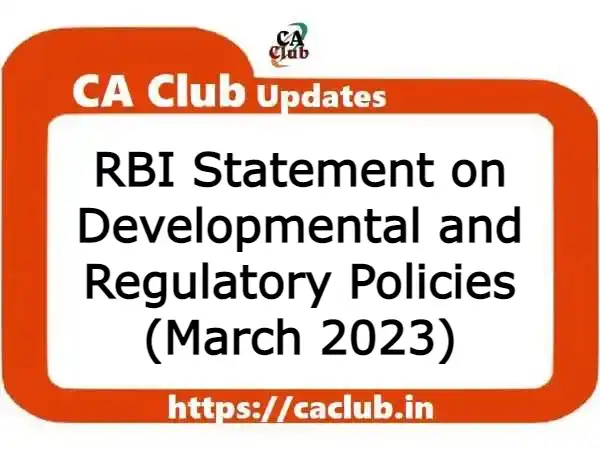This article discusses the recent RBI Statement on Developmental and Regulatory Policies, which outlines various policy measures relating to Financial Markets, Regulation and Supervision, and Payment and Settlement Systems.
I. Financial Markets
1. Developing an Onshore Non-deliverable Derivatives Market
The Reserve Bank of India (RBI) has decided to permit banks with International Financial Services Centre (IFSC) Banking Units (IBUs) to offer INR Non-deliverable foreign exchange derivative contracts (NDDCs) to resident users in the onshore market. This move aims to develop the onshore INR NDDC and provide residents with the flexibility to efficiently design their hedging programs. Banks will have the option to settle their NDDC transactions with non-residents and with each other in foreign currency or INR, while transactions with residents must be settled in INR. The RBI will issue related directions separately.
II. Regulation and Supervision
2. Enhancing Efficiency of Regulatory Processes
In an effort to simplify, ease, and reduce the cost of compliance, the RBI has decided to develop a secured web-based centralized portal called ‘PRAVAAH’ (Platform for Regulatory Application, Validation And AutHorisation). This portal will gradually extend to all types of applications made to RBI across all functions, streamlining the license and authorization processes for entities regulated by the central bank.
3. Development of Centralised Web portal for Public to Search Unclaimed Deposits
To improve and widen access for depositors and beneficiaries searching for unclaimed deposits, the RBI has decided to develop a web portal that enables users to search across multiple banks based on their inputs. The search results will be enhanced by the use of certain AI tools, making it easier for individuals to locate their unclaimed deposits.
4. Grievance Redress Mechanism for Credit Information Reporting and Credit Information Companies
The RBI is working to strengthen and improve the efficacy of the grievance redress mechanism and customer service provided by credit institutions (CIs) and credit information companies (CICs). Measures include bringing CICs under the Reserve Bank Integrated Ombudsman Scheme (RB-IOS), implementing a compensation mechanism for delayed updation/rectification of credit information, providing SMS/email alerts to customers when their credit information is accessed from CICs, setting a timeframe for ingestion of data received by CICs from Credit Institutions, and disclosing the number and nature of customer complaints on the website of CICs. Detailed guidelines will be issued shortly.
III. Payment and Settlement Systems
5. Operation of Pre-Sanctioned Credit Lines at Banks through the UPI
The Unified Payments Interface (UPI) currently handles 75% of the retail digital payments volume in India. The RBI aims to expand the scope of UPI by enabling transfer to and from pre-sanctioned credit lines at banks, in addition to deposit accounts. This expansion will allow the UPI network to facilitate payments financed by credit from banks, potentially reducing the cost of such offerings and promoting the development of unique products for Indian markets. Detailed instructions will be issued separately.
In conclusion, the RBI’s developmental and regulatory policies aim to create a more robust, secure, and inclusive financial sector in India. By focusing on key areas such as financial markets, regulation and supervision, payment and settlement systems, etc., the central bank is driving the nation towards a more prosperous future.
